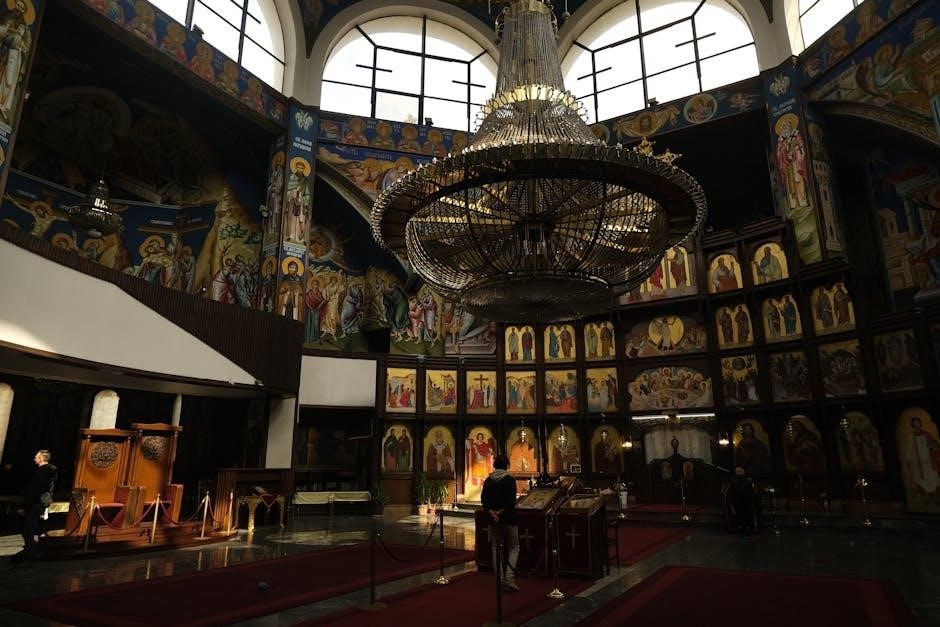st 119.1 pdf
The ST 119․1 Exempt Purchase Certificate is a document issued by the New York State Department of Taxation and Finance․ It enables eligible organizations to make tax-exempt purchases of tangible personal property or taxable services․ This certification is essential for qualifying organizations to avoid sales and use taxes on eligible transactions, simplifying the purchasing process for exempt entities․
Eligibility Criteria for Exempt Organizations
To qualify for the ST 119․1 Exempt Purchase Certificate, organizations must meet specific eligibility criteria set by the New York State Department of Taxation and Finance․ Eligible entities include non-profit organizations, educational institutions, governmental agencies, and other tax-exempt entities recognized under Section 501(c)(3) of the Internal Revenue Code․ These organizations must provide documentation, such as a 501(c)(3) determination letter, to verify their exempt status during the application process․
The exempt organization must be the direct purchaser and payer of record for the goods or services․ The purchases must be for the organization’s exempt purposes and not for resale or personal use․ Additionally, the organization must not use the certificate to purchase motor fuel or diesel motor fuel, as these are excluded from tax exemption under this program․
Organizations must apply for an Exempt Organization Certificate (ST-119) before using the ST 119․1 form․ This ensures compliance with state tax regulations and verifies the organization’s eligibility to make tax-exempt purchases․ The certificate is issued by the New York State Tax Department and contains a unique six-digit exemption number, which must be presented to vendors at the time of purchase․
By meeting these criteria, eligible organizations can streamline their purchasing processes and avoid unnecessary tax burdens on qualifying transactions․
Types of Purchases Covered Under ST 119;1
The ST 119․1 Exempt Purchase Certificate applies to specific types of purchases made by eligible organizations․ It primarily covers tangible personal property and taxable services that are directly related to the organization’s exempt purposes․ Examples include office supplies, equipment, and services used in the operation of the organization․
The certificate does not apply to certain purchases, such as motor fuel or diesel motor fuel, which are explicitly excluded from tax exemption under this program․ Additionally, purchases for resale or personal use are not eligible for exemption․
To qualify for tax exemption, the purchases must be made by the exempt organization itself, and the organization must be the direct purchaser and payer of record․ This ensures that the exemption is applied correctly and complies with state tax regulations․
By understanding the types of purchases covered under the ST 119․1, organizations can effectively utilize the certificate to streamline their procurement processes and avoid unnecessary tax liabilities on eligible transactions․
Application Process for ST 119․1
To obtain the ST 119․1 Exempt Purchase Certificate, eligible organizations must follow a structured application process․ The process begins with submitting Form ST-119․2, which is the application for an Exempt Organization Certificate․ This form requires detailed information about the organization, including its purpose, structure, and tax-exempt status․
Organizations must also provide supporting documentation as outlined in the instructions for Form ST-119․2․ For example, if the organization has applied for and received federal income tax exemption under Section 501(c)(3) of the IRS, a copy of the determination letter must be included․ This ensures the organization meets both state and federal tax-exempt requirements․
Once the application is approved, the New York State Department of Taxation and Finance issues the organization a six-digit exemption number․ This number is specific to New York State and is not the same as the organization’s federal Employer Identification Number (EIN)․ The certificate is then valid for use with vendors to make tax-exempt purchases․
It’s important to note that the ST 119․1 certificate remains valid indefinitely unless the organization’s tax-exempt status changes or is revoked․ Organizations must ensure they maintain compliance with all applicable regulations to continue using the certificate effectively․

Using the ST 119․1 Certificate with Vendors
Once an organization obtains the ST 119․1 Exempt Purchase Certificate, it must be presented to vendors at the time of purchase to ensure tax-exempt transactions․ This certificate verifies the organization’s eligibility to make purchases without incurring sales and use taxes in New York State․
For single purchase certificates, the organization must provide the completed ST 119․1 form to the vendor during the initial transaction․ This form includes the organization’s exempt status, certificate number, and purchase details․ For blanket certificates, the organization’s name, address, and exemption number must appear on the vendor’s sales slip or invoice for subsequent purchases․
Vendors may request a copy of the ST 119․1 certificate for their records, ensuring compliance with state tax regulations․ It’s the organization’s responsibility to maintain accurate documentation and provide updates if the exemption status changes․ Note that this certificate cannot be used for purchases of motor fuel or diesel fuel, which have specific tax rules․
By properly using the ST 119․1 certificate, organizations can streamline tax-exempt purchases, reducing administrative burdens and ensuring compliance with New York State tax laws․

Compliance and Legal Considerations
Organizations using the ST 119․1 Exempt Purchase Certificate must adhere to strict compliance and legal requirements to maintain their tax-exempt status․ The certificate is only valid if the organization is the direct purchaser and payer of record, and the purchased items or services are used exclusively for exempt purposes․
The ST 119․1 form cannot be used for purchasing motor fuel or diesel motor fuel, as these items have specific tax rules․ Organizations must ensure all information provided on the form is accurate and complete, as any misuse or misrepresentation can result in penalties, fines, or revocation of the exemption․
Vendors must also comply with state tax regulations by accepting the ST 119․1 certificate as valid proof of exemption․ Organizations should maintain detailed records of all exempt purchases, including copies of the certificate and related documentation, to demonstrate compliance during audits or reviews․
Failure to comply with these requirements may lead to legal consequences, including retroactive tax assessments and interest․ Therefore, organizations must stay informed about New York State tax laws and ensure proper use of the ST 119․1 certificate in all transactions․

Blanket vs․ Single Purchase Certificates
The ST 119․1 Exempt Purchase Certificate is available in two forms: a Blanket Certificate and a Single Purchase Certificate․ The primary difference lies in their scope and duration of use․
A Blanket Certificate is ideal for organizations that make frequent purchases from the same vendor․ It covers multiple transactions with a specific seller over an extended period, eliminating the need to provide a new certificate for each purchase․ This option is convenient for establishing long-term vendor relationships․
A Single Purchase Certificate, on the other hand, is used for one-time transactions․ It is tied to a specific purchase and expires after that transaction is completed․ This type is suitable for organizations with infrequent or irregular purchasing needs․
Both certificates require the organization to be the direct purchaser and payer of record, and the purchased items must be used for exempt purposes․ Choosing the correct type depends on the organization’s purchasing frequency and vendor relationships․
Validity and Renewal of ST 119․1
The ST 119․1 Exempt Purchase Certificate remains valid as long as the organization retains its tax-exempt status and continues to meet the eligibility criteria set by the New York State Department of Taxation and Finance․ Unlike some certifications, the ST 119․1 does not have an expiration date and does not require periodic renewal unless specific changes occur․
However, if there are changes to the organization’s structure, name, or address, the certificate must be updated․ Organizations must also ensure that their exempt status is maintained, as the certificate’s validity is directly tied to their tax-exempt standing․ If an organization’s exempt status is revoked or altered, the ST 119․1 becomes invalid, and a new certificate must be obtained․
Renewal, when necessary, involves submitting updated documentation to the New York State Tax Department․ The department will issue a new certificate if the organization continues to qualify․ It is crucial for organizations to keep their information current to avoid interruptions in their ability to make tax-exempt purchases․

Common Mistakes to Avoid
When using the ST 119․1 Exempt Purchase Certificate, organizations must be vigilant to avoid common errors that could result in the denial of tax exemptions․ One of the most frequent mistakes is failing to complete the form fully and accurately, such as omitting the organization’s 6-digit exemption number or providing incorrect seller or purchaser details․
Another common error is using the certificate for ineligible purchases, such as motor fuel or diesel, which are explicitly excluded from tax-exempt status under this program․ Organizations must also ensure they are the direct purchaser and payer of record, as third-party purchases are not covered by the ST 119․1․
Additionally, some organizations mistakenly assume the certificate is transferable or can be shared with affiliates or subsidiaries without proper authorization․ This is not permitted, as each exempt organization must obtain its own certification․ Failing to update the certificate following changes in the organization’s name, address, or tax-exempt status can also lead to invalidation․
Lastly, organizations should avoid using expired or invalid certificates and must maintain proper documentation to support their exempt purchases․ Addressing these common pitfalls ensures compliance and uninterrupted access to tax-exempt benefits․
The ST 119․1 Exempt Purchase Certificate is a critical tool for eligible organizations in New York State, enabling them to make tax-exempt purchases of tangible personal property and taxable services․ By understanding the eligibility criteria, application process, and proper usage of this certificate, organizations can streamline their purchasing operations and avoid unnecessary tax liabilities․
Key to compliance is ensuring all purchases align with the certificate’s requirements and avoiding common pitfalls, such as incomplete forms or ineligible purchases․ Organizations must also stay informed about updates to the program and maintain accurate documentation to support their exempt status․
